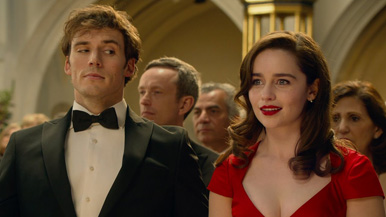|
|
Movie Review: Me Before YouBy Matthew HuntleyJune 14, 2016
The cut-and-dry story takes place a few years after a near-fatal yet still tragic motorcycle accident renders Will Traynor (Sam Claflin), a young, athletic hotshot, paralyzed from the neck down. Will is the only son of wealthy parents (Janet McTeer and Charles Dance), who occupy a castle in a remote English village outside London and who've turned their horse stables into a medical facility for their son. They're looking to employ someone who can attend to Will throughout the day besides his nurse, Nathan (Steven Peacocke), who handles all the physical work like dressing, bathing, and moving Will from his bed to his wheelchair. Here's where Louisa “Lou” Clark (Emilia Clarke) comes in. She's 26 and a member of the working class who still lives with her parents (Brendan Coyle and Samantha Spiro). Lou has just lost her job as a waitress at the local cafe and applies to be Will's caretaker, and given how poorly she presents herself during the interview (in a scene that's desperate for laughs but doesn't really yield any), I was surprised Will's mom hires her on the spot, but she does, and so Will and Lou's inevitable romance begins. Of course, as you no doubt guessed, their relationship starts out rocky, with Will thinking Lou mostly a foolish and silly heart, not to mention weird, obnoxious, overly cheerful and a gaudy dresser with her loud stockings and sweaters. Lou, meanwhile, tries her best to remain positive but honestly sees Will as a self-pitying misanthrope who's lost his spark for life. Things start to change, however, once Will accepts he actually needs Lou and they talk candidly with each other about things like family, school and careers. Their friendship turns amorous, leaving Lou's exercising-obsessed boyfriend, Patrick (Matthew Lewis), with no one to cheer him on at his next triathlon (a development we more or less saw happening instantaneously). All this happens after Lou learns of Will's plans to end his own life legally, which prompts Lou to engage with him on a more personal level and research what he used to be into prior to his accident. She schedules a series of trips and activities that she hopes will remind him just how wonderful life can be. Whether or not Will finally decides to act on his suicide plans I leave for you to discover, but no matter what his decision, it doesn't change the fact Me Before You gets mired down in virtually every convention and cliché known to the genre and remains steadfastly unapologetic about it. I suppose I didn't find this too annoying because the actors themselves are charming, despite the restrictions the screenplay imposes upon them. Claflin and Clarke are naturals on-screen and have good chemistry, which is why we wish director Thea Sharrock had simply allowed them to talk about things other than what the plot required just so the story could get from A to B. There are a few moments where we think the movie might extend itself beyond its contrivances and actually break free, but those only end up as thoughts and not actualities. Is Me Before You a “bad” movie? Not exactly, because it doesn't offend us so much as leave us unmoved. But if Hollywood has gotten so repetitive that we're prone to judging a movie by the degree to which it veers off the traditional path, then we're forced to label Me Before You a failure. Okay, “failure” seems harsh. Let's call it sub-average dull, which I suppose are better qualities than distasteful and insulting, though the latter would have made the movie more fun to write about.
|

|
|
|

|
Thursday, October 31, 2024
© 2024 Box Office Prophets, a division of One Of Us, Inc.


